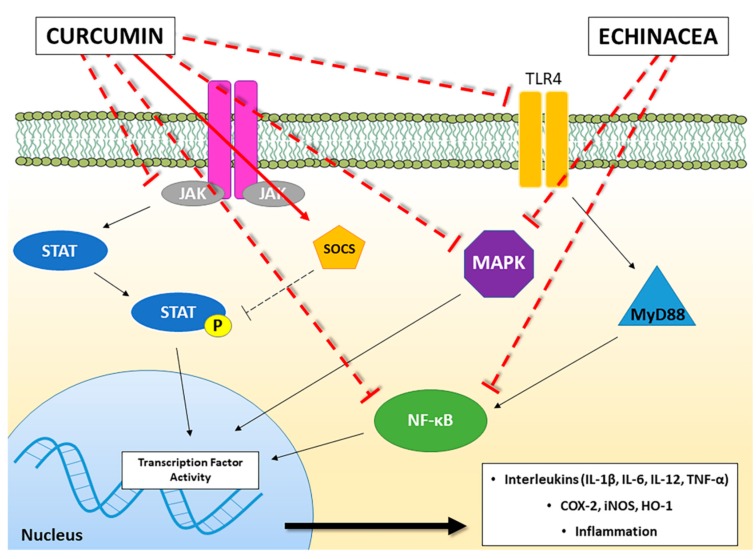Catanzaro Michele, et al.
Molecules, 2018
Abstract
The immune system is an efficient integrated network of cellular elements and chemicals developed to preserve the integrity of the organism against external insults and its correct functioning and balance are essential to avoid the occurrence of a great variety of disorders. To date, evidence from literature highlights an increase in immunological diseases and a great attention has been focused on the development of molecules able to modulate the immune response. There is an enormous global demand for new effective therapies and researchers are investigating new fields. One promising strategy is the use of herbal medicines as integrative, complementary and preventive therapy. The active components in medical plants have always been an important source of clinical therapeutics and the study of their molecular pharmacology is an enormous challenge since they offer a great chemical diversity with often multi-pharmacological activity. In this review, we mainly analysed the immunomodulatory/antinflammatory activity of Echinacea spp. and Curcuma longa, focusing on some issues of the phytochemical research and on new possible strategies to obtain novel agents to supplement the present therapies.
Keywords
Echinacea; curcumin; curcumin analogues; immune system; immunomodulators; signal transduction pathways.
Conflict of interest statement
The authors confirm that there are no known conflicts of interest associated with this publication.Figures

A schematic representation of the main molecular pathways linked to inflammatory and immunomodulatory activities modulated by Curcumin and Echinacea. The solid red line indicates the activation of the pathway, whereas the truncated red line indicates inhibition of the pathway. JAK: Janus kinase; STAT: Signal Transducers and Activators of Transcription; SOCS: Suppressor of Cytokine Signalling proteins; TLR-4: Toll-like Receptor-4; MyD88: Myeloid Differentiation primary response 88; NF-κB: Nuclear Factor kappa B; MAPK: Mitogen-Activated Protein Kinase; COX-2: cyclooxygenase-2; iNOS: inducible Nitric Oxide Synthase; HO-1: Heme Oxygenase-1; IL: Interleukin; TNF: Tumor Necrosis Factor.
| PMID: | 30373170 |
|---|---|
| DOI: | 10.3390/molecules23112778 |
| PMCID (Free PMC Article): | PMC6278270 |
| Category: | Immune |
The best supplements with Curcuma Longa or Curcumin in Immune category:
- TOXIC OFF - To create the Toxic Off formula, scientists have researched hundreds of ingredients with powerful anti-parasitic properties. It contains among others: Curcuma Longa, Curcumin.
- Detoxyn - Most of the human population are carriers of at least one parasite. It contains among others: Curcuma Longa, Curcumin.
- Daily Digestive Enzymes with Prebiotics + Probiotics, 180 Vegetarian Capsules (Zenwise Health) - Zenwise Health Digestive Enzymes contain a specialized blend of plant-sourced Enzymes, Prebiotics, and Probiotics that encourage daily digestive health for men and women. It contains among others: Curcuma Longa.
- Immunity 911 - Extra Powerful Ingredients for Your Stronger Immunity -
Immunity 911 - Advanced Immune Boster Formula Your First Line Of Defense Against Infection!
Viruses are floating all around us, ready to filter into our body any moment completely unnoticed. It contains among others: Curcuma Longa. - Boswellia Extract, 250 mg, 120 Veg Capsules (Now Foods) - NOW Boswellia Extract is a standardized extract of Boswellia serrata, also known as Frankincense, a resinous botanical that has been traditionally used by Ayurvedic herbalists for centuries. It contains among others: Curcumin.
Articles similar to "Immunomodulators Inspired by Nature: A Review on Curcumin and Echinacea."
- The significance of Curcuma Longa for Immune: Effects of Water Extract of Curcuma Longa (L.) Roots on Immunity and Telomerase Function. (Background Immunity and Longevity Methods A water extract of Curcuma longa (L...)
- The role of Curcumin in Immune: Anti-inflammatory Properties of Curcumin, a Major Constituent of Curcuma Longa: A Review of Preclinical and Clinical Research. (Curcuma longa (turmeric) has a long history of use in Ayurvedic medicine as a treatment for inflammatory conditions...)
Previous article
Effects of Water Extract of Curcuma Longa (L.) Roots on Immunity and Telomerase Function.

























































